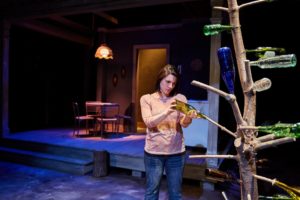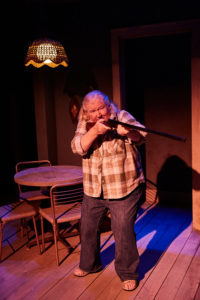
 Recommended *** During its many years of developing new works, Stage Left Theatre has premiered a number of plays which make a nuanced examination of a current controversy. The latest, The Bottle Tree by local playwright Beth Kander, is the last play to be developed under the artistic leadership of Vance Smith, but is directed by one of his successors, Amy Szerlong. Like The Burials, the recent Steppenwolf for young adults show, The Bottle Tree is about the sister of a school shooter trying to put her life back together. However, while The Burials was modeled on Antigone, The Bottle Tree eschews traditional plotting. Instead, we see fragments of the life of the main character presented out of chronological sequence, creating a contemplative mosaic.
Recommended *** During its many years of developing new works, Stage Left Theatre has premiered a number of plays which make a nuanced examination of a current controversy. The latest, The Bottle Tree by local playwright Beth Kander, is the last play to be developed under the artistic leadership of Vance Smith, but is directed by one of his successors, Amy Szerlong. Like The Burials, the recent Steppenwolf for young adults show, The Bottle Tree is about the sister of a school shooter trying to put her life back together. However, while The Burials was modeled on Antigone, The Bottle Tree eschews traditional plotting. Instead, we see fragments of the life of the main character presented out of chronological sequence, creating a contemplative mosaic.
We first see Alley Mason (Kathryn Acosta) as a twenty-five year old being interviewed by a documentary film maker on the tenth anniversary of her brother’s rampage. She doesn’t try to distance herself from him, insisting that he be called her “brother” instead of her “half-brother,” and has become an anti-gun violence activist. But the interviewer’s questions cause her to flash back to her first days at a new school following the massacre, and strange moments with her great aunt which she only realizes the significance of in retrospect. Alley’s mother, Rhoda (Christina Gorman), worked hard to support her children without a husband, and heavily relied on her mother’s sister, Myrna (Kathleen Ruhl) for help raising them. Myrna also raised Rhoda, and though she got a little dotty in her old age while Alley and her brother, Douglas, were teenagers, she had always been a strong believer in ghosts. The bottle tree in their yard was meant to facilitate communication with them, though it never did so in a manner that allowed listeners to state conclusively what the spirits wanted.
Myrna’s scenes are somewhat mystical simply because, in some of them, there is no living person who could possibly be recalling them. During these, lighting designer Matt Kooi washes the stage in an orange glow, and Stephen Gawrit’s original music becomes more pronounced. But Ruhl’s performance is what really makes Myrna’s presence memorable. Besides being completely believable, Ruhl’s earthy character is lovable, but somewhat alarming in how clearly out-of-touch she is. She’s the kind of guardian whose wards can only feel nostalgic for because she died while they were still children, and a great deal of Alley’s post-massacre distress is shown by her uncertainty in how to use Myrna’s bottle tree. Her therapist, Dr. Berlin (David Lawrence Hamilton) suggested that she and Rhoda add a bottle on good days and remove one on bad days, but Alley finds that she only ever removes them, and usually smashes them while doing so.
Alley expected her transition to a new school to be extremely uncomfortable, and it was. Anybody who remembers annoying couples in high school will chuckle at Allyce Torres and Nick Savin’s portrayal of Monica and Rick, Alley’s new classmates who practically never take their hands off each other. She also makes a new friend, Joseph (Emilio Velasco), who has a secret of his own, and is the only person to reach out to her after learning who she’s related to. Joseph and Alley’s relationship is heartwarming, but their opinions turn out to be quite different, despite Joseph’s attempt to make friends. This is the part of Alley’s life which Kander allows us to see the most of, and it’s both clever and frustrating.
The story of Alley’s struggle to re-establish a sense of normalcy in the face of suspicion represented by Monica and Rick is well-developed (except for one annoying scene in which the same character reveals information he has already revealed to someone else). Acosta demonstrates her skill as an actress in shifting between Alley’s ages, and allowing us to see both the woman with more distance and the hurt, angry teenager. Her feelings about her brother evolve from denying her relationship to him to acknowledging it, but saying he should be consigned to oblivion, and that not even his motivation should be investigated. Even as an activist, her beliefs are incoherent and she’s oddly reluctant to tell her story or explain her work. Kander gives us some idea of why Alley’s reactions are what they are, but the play offers little in the way of a solution even for Alley’s personal recovery, let alone societal improvement, unless Alley is to be taken as a negative example. That’s not necessarily a bad thing, though it may be contrary to audience expectations. For an audience member who simply wants to get a handle on what sort of things go through the mind of someone affected by violence, without an attempt to impose a meaning on that experience, The Bottle Tree is an interesting venture and presents a perspective which might be useful even if it’s one that doesn’t claim to possess all the answers.
Stage Left Theatre’s The Bottle Tree will be running at Theater Wit, 1229 W Belmont Ave, Chicago, thru November 20. Running time is two hours and ten minutes, with one intermission. Performances are as follows:
Fridays at 8:00 p.m.
Saturdays at 8:00 p.m.
Sundays at 3:00 p.m.
Tickets are $20-30 and can be purchased by calling 773-975-8150 or visiting theaterwit.org or stagelefttheatre.com. Free parking is available behind Cooper’s restaurant.
To see what others are saying, visit www.theatreinchicago.com, go to Review Round-Up and click at “The Bottle Tree.”







More Stories
“Prayer for the French Republic” reviewed by Julia W. Rath ( and another by Paul Lisnek)
“Obliteration” reviewed by Mark Reinecke
” A Jukebox for the Algonquin”